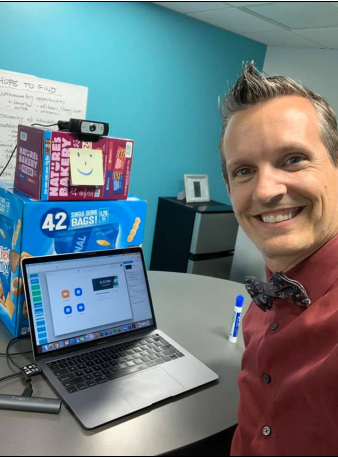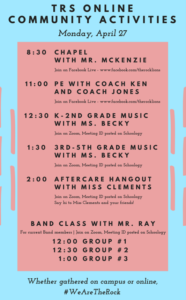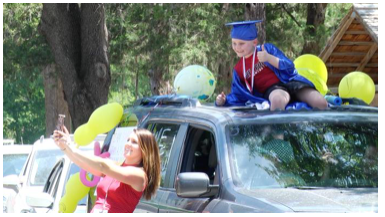
Last week, the headmaster at The Rock School, a Christian school in Gainesville, Florida, led a Zoom town hall with hundreds of parents. All of them had re-enrolled their children for the fall back in February, before COVID-19 upended everything. But Jim McKenzie told them during the meeting that if they wanted out of their contracts, the school understood. Just let the school know by June 1, he said.
The result? The parents of 26 students, 6 percent of the total, reluctantly opted out, with most of them saying they wanted to homeschool a year.
The impact? With waiting lists for every grade, The Rock School should be at or near capacity in the fall, no matter what the pandemic has in store.
Even in these trying times, McKenzie and his PreK-12 school are holding their own. They’ve found creative ways to relentlessly emphasize all the things, beyond academics, that make The Rock distinctive and desired. Faith. Family. Identity. Community. To date, that has made the difference.
Transitioning to a virtual education reality “wasn’t necessarily easy for parents, but what they appreciated was they stayed connected,” McKenzie said. “Whether we’re on campus or we’re online, we are The Rock. That’s been our motto.”
“No matter the circumstance, you’re still our community,” McKenzie continued. “That community can still exist, even in the middle of COVID-19.”
The hopeful situation at The Rock School may appear to be at odds with dire concerns about private schools across America. It would be tragic to see it that way. Private schools face real challenges in the months ahead. Many are worried about bleeding enrollment. Dozens have already closed. Their plight, the prospect of equitable relief, the negative repercussions for public schools – none of that has received the attention it deserves.
But The Rock School still offers lessons, both to private schools struggling to maintain enrollment and to other audiences who may better see the value that private schools bring to families and communities – and by extension, to all of us.
“A lot of times Christian schools get caught up in what I call me-too branding,” McKenzie said. “Oh, you know, the big public school’s doing this. Oh, me too. Oh, you’re teaching Latin. Oh, me too. Oh, you’re starting a lacrosse program. Oh, me too. Oh, you’re giving every kid an iPad. Oh, me too. We copy in an effort to keep up.”
“The problem is, I don’t have the resources to copy what the large public school systems in our area can do. So instead I have to look for ways to differentiate myself. I have to look for things … that would be hard for my competitors to copy but are a meaningful difference for the people that we serve.”
“There’s a lot of people that can deliver reading and math academic content in an online format, as good or better than I did, right?” McKenzie continued. “So, the piece that differentiates my school … is this idea of community.”
About a third of the 435 K-12 student at The Rock School use state choice scholarships, including 108 who use the Florida Tax Credit Scholarship for lower-income students and 15 who use Gardiner Scholarships for students with special needs. (Both programs are administered by Step Up For Students, which hosts this blog.) Having a high percentage of non-scholarship parents makes the school more vulnerable to economic turbulence. Being in Gainesville, a college town that is more recession-resistant than many places, makes it less so.

The Rock School had a good academic reputation long before the pandemic, and in the wake of school closures it quickly built a quality distance learning program. Its “TRS Online” was geared to flexibility with a personal touch. Core academic content was delivered via videos, so students and parents could work them into schedules that were best for them. Teachers could be reached by Zoom daily. Staff checked in with families at least once a week.
But that was just the basics.
What The Rock did beyond the basics endeared it even more to its students and parents. It didn’t shrink its events calendar. It expanded it. It made sure there was something to keep everyone in the school community engaged – and to pique the interest of prospective parents and others who might be on the outside looking in.
McKenzie joked that he felt like “the cruise director of the SS Rock School.”
On a field outside town, the school hosted a dance party for its high school students, complete with DJs and glow sticks to help make the social distancing tolerable. The school broadcast the event on facebook live. Ditto for chapel, book readings, lessons in art class. Ditto for a talent show, where McKenzie sported a red-and-black tux. Ditto for gym, where Coach Jones and Coach Ken became celebrities, with some of their classes getting 1,000 views. The Rock’s pet show reached 7,000 people. Its last-day-of-school parade made news.

“We felt like there was still a way to provide students this meaningful experience,” McKenzie said. “Where most people’s default was, ‘Well, because of Covid, I guess we’ll have to cancel everything,’ you know, we said, ‘Well, how can we do it differently? How can we translate what we have done to a virtual context that works in the midst of a pandemic?’ ”
McKenzie won’t fit snugly in anybody’s box. He started college as an engineering major, fell in love with teaching, ended up earning a master’s in education from the University of Florida. He’s partial to bow ties. He’s as comfortable quoting marketing gurus as he is as citing Bible scripture. Over the past 10 years, he helped triple The Rock’s enrollment and made it even more racially and economically diverse. (The school is 42 percent non-white.)
In a TEDx talk last year, he pitched a revolution for public education, suggesting lost relevance in an era where millions of current students will work in jobs that don’t yet exist. “Critics will say our education system needs to be reformed. No,” he said. “Our current educational system needs to be re-imagined. We need to stop doing things better. And start doing better things.”
It’s not hard to find folks who predict the pandemic will springboard big change. But in the meantime, thousands of little private schools need to survive it. McKenzie thinks they can better their odds by better telling their own stories, and better highlighting what makes them special. (Get McKenzie’s in-depth take on that subject in this webinar here.)
In that virtual town hall, McKenzie didn’t shy from telling The Rock’s parents about the uncertainty ahead. But he also asked them to compare their pandemic experience with the parents at other schools.
“I think we have proven to be a proven and trusted guide in the midst of a crisis,” McKenzie told them. “And so if the COVID-19 crisis isn’t going away any time soon … isn’t it worth knowing that if things escalate again in our community, that you have a school that you know can manage the crisis again?”
In front of hundreds of screens in the school’s orbit, heads nodded.


